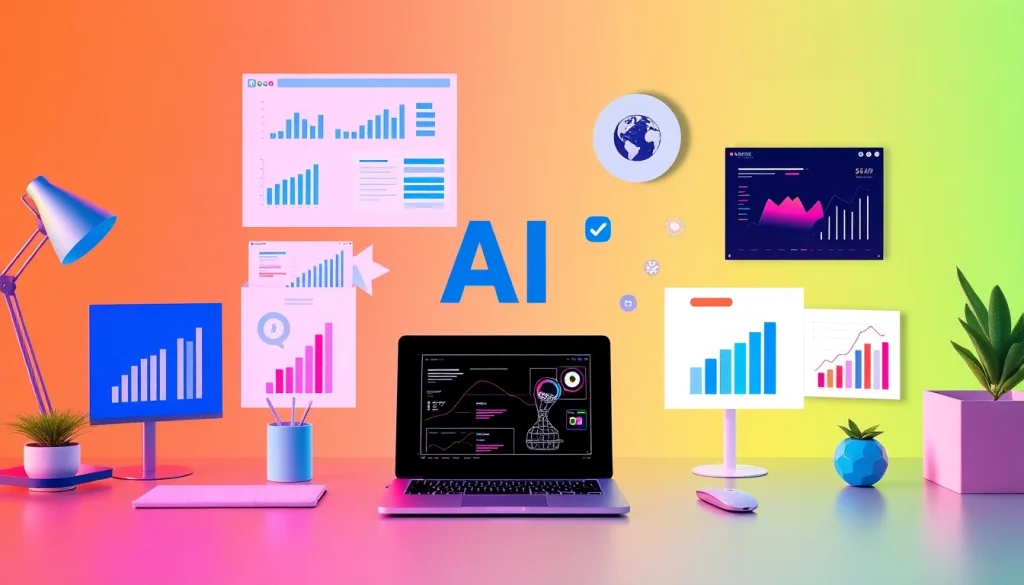Unlock Your Potential: Top AI Marketing Tools to Boost Business Growth

Introduction to AI Marketing Tools
In today’s rapidly evolving digital landscape, businesses are increasingly turning to AI marketing tools to enhance their marketing strategies. These innovative solutions leverage artificial intelligence to automate tasks, optimize workflows, and deliver personalized customer experiences. Understanding what AI marketing tools are, their significance, and how they are transforming the marketing industry is essential for organizations aiming to stay competitive in 2025 and beyond.
What Are AI Marketing Tools?
AI marketing tools encompass a diverse range of software solutions that utilize artificial intelligence to aid marketing professionals in various tasks. These tools can automate repetitive tasks, analyze consumer behavior, generate insights, and even create content. From chatbots that enhance customer engagement to predictive analytics platforms that inform strategy, AI marketing tools represent a significant advancement in how businesses can connect with consumers.
The Importance of AI in Marketing
The integration of AI in marketing has revolutionized how brands interact with their audience. Here are several key reasons why AI is crucial in modern marketing:
- Efficiency: Automating repetitive tasks such as data entry and customer segmentation allows marketers to focus on more strategic initiatives.
- Personalization: AI tools can analyze customer data to deliver tailored experiences, improving engagement and customer loyalty.
- Data-Driven Insights: AI analyzes vast amounts of data, providing marketers with actionable insights that can inform decision-making processes.
- Cost Reduction: By automating tasks and optimizing marketing campaigns, businesses can lower costs associated with manual processes.
Current Trends in AI Marketing
As AI technology continues to advance, several trends are emerging in the realm of marketing:
- Increased Use of Chatbots: Many companies utilize AI-driven chatbots for customer service, providing instant responses and support 24/7.
- Predictive Analytics: Tools are now being used to forecast trends and consumer behavior, enabling companies to make proactive marketing decisions.
- Content Generation: Advanced AI models are capable of producing high-quality content, assisting marketers in maintaining consistency and volume.
- Voice Search Optimization: As smart speakers become more prevalent, marketers are adapting their strategies to accommodate voice search.
Key Features of Leading AI Marketing Tools
Automation Capabilities
Automation is a cornerstone of AI marketing tools. They can streamline workflows, reduce human error, and improve efficiency. Key automation capabilities include:
- Email Marketing Automation: Tools can segment email lists and send personalized content to customers automatically, improving open and conversion rates.
- Social Media Management: Scheduling posts, analyzing engagement metrics, and generating reports can all be automated, saving time and resources.
- Lead Scoring: AI algorithms can evaluate potential customers and score them based on their likelihood to convert, allowing sales teams to prioritize effectively.
Data Analytics and Insights
Data-driven decision-making is enhanced through AI’s analytical capabilities. By sifting through large datasets, AI can reveal insights such as:
- Customer Segmentation: AI tools classify customers into segments based on behavior, allowing for targeted marketing strategies.
- Predictive Modeling: These models help predict future customer behavior, enabling businesses to tailor their offerings and marketing messages.
- Performance Tracking: Marketers can evaluate campaign effectiveness in real-time, adjusting strategies to maximize ROI.
Content Creation and Management
AI technology is increasingly capable of generating and managing content. This includes:
- Automated Copywriting: Tools like Jasper can create engaging marketing materials, blog posts, and ad copy based on specified parameters.
- Content Curation: AI can help in the discovery of relevant content to share on social media, ensuring brands remain engaged with their audiences.
- SEO Optimization: AI-driven tools can analyze and suggest improvements to help content rank better in search engines.
Top AI Marketing Tools for Businesses in 2025
Overview of Popular Tools
As businesses look to implement AI marketing tools in 2025, several platforms stand out for their robust features and proven effectiveness:
- HubSpot: An all-in-one platform that offers CRM, content management, and marketing automation.
- Jasper: A powerful tool for content generation that uses advanced AI to create high-quality marketing materials.
- Buffer: A social media management platform that streamlines scheduling and posting across multiple channels.
- Zapier: Facilitates the automation of workflows between different applications, enhancing efficiency.
Comparison by Features and Pricing
When selecting AI marketing tools, businesses must compare features, pricing, and ease of use. Here’s a breakdown of some leading tools based on these factors:
| Tool | Key Features | Pricing |
|---|---|---|
| HubSpot | CRM, Email Marketing, Automation | Starts at $45/month |
| Jasper | Content Creation, SEO Optimization | From $39/month |
| Buffer | Social Media Scheduling, Analytics | Starts at $15/month |
| Zapier | Workflow Automation, Integration | Free up to 5 Zaps; paid plans from $19.99/month |
User Feedback and Case Studies
Real-world examples of businesses using AI marketing tools effectively offer invaluable insights. For instance:
- Company A: Implemented HubSpot to enhance lead generation, resulting in a 35% increase in conversion rates within six months.
- Company B: Used Jasper for their blog content, reducing content creation time by 50% while increasing readership by 200%.
- Company C: Leveraged Buffer to manage their social media presence, achieving a 40% increase in engagement through optimized posting schedules.
Implementing AI Tools in Your Marketing Strategy
Steps for Effective Integration
Integrating AI marketing tools into your existing strategy involves several critical steps:
- Define Objectives: Clearly outline what you aim to achieve with the integration of AI tools.
- Choose the Right Tools: Select tools based on your defined objectives, budget, and the specific needs of your marketing team.
- Create a Pilot Program: Implement a pilot project to test the effectiveness of the tools before a full rollout.
- Train Your Team: Provide training for your team to maximize the benefits of the new tools.
- Evaluate and Iterate: Regularly review the performance of the tools and make adjustments as necessary.
Measuring Performance and ROI
To assess the impact of AI marketing tools, businesses should establish key performance indicators (KPIs) such as:
- Conversion Rate
- Customer Acquisition Cost
- Return on Investment (ROI)
- Engagement Metrics (likes, shares, comments)
Regularly tracking and analyzing these metrics will allow businesses to refine their marketing strategies further and enhance the effectiveness of their AI tools.
Common Pitfalls to Avoid
While implementing AI marketing tools can yield significant benefits, there are common pitfalls to watch for:
- Over-reliance on Automation: While automation is beneficial, failing to maintain a human touch can alienate customers.
- Lack of Data Accuracy: Ensure that the data used for training AI models is accurate and relevant; poor data quality can lead to faulty insights.
- Neglecting Team Involvement: Involve your marketing team in the decision-making process to ensure buy-in and successful adoption.
Future of Marketing: AI’s Role Going Forward
Predictions for AI in Marketing
As technology evolves, the role of AI in marketing is expected to grow significantly. Some predictions for the future include:
- Increased Personalization: Brands will leverage AI to deliver hyper-personalized experiences based on individual customer preferences and behaviors.
- Enhanced Predictive Analytics: Businesses will rely more on advanced predictive analytics to anticipate consumer needs and trends.
- Greater Integration with Other Technologies: AI marketing tools will increasingly integrate with other digital technologies such as AR and VR.
Evolving Customer Expectations
As consumers become more accustomed to personalized experiences, their expectations of brands are changing. Customers now expect:
- Instant Gratification: Quick responses and tailored communication are becoming the norm.
- Transparency: Brands must be transparent about how they use customer data, building trust through ethical practices.
- Seamless Experiences: Customers favor brands that provide integrated and cohesive experiences across all touchpoints.
Staying Ahead with Technology
To remain competitive, businesses must continuously adapt to new technologies. This includes:
- Investing in Continuous Learning: Regular training and upskilling of marketing teams will help them stay proficient in using new AI tools.
- Monitoring Industry Trends: Staying informed about emerging AI technologies will allow businesses to adopt innovative solutions proactively.
- Fostering a Culture of Innovation: Encourage experimentation and open-mindedness within your team to explore new AI marketing opportunities.







